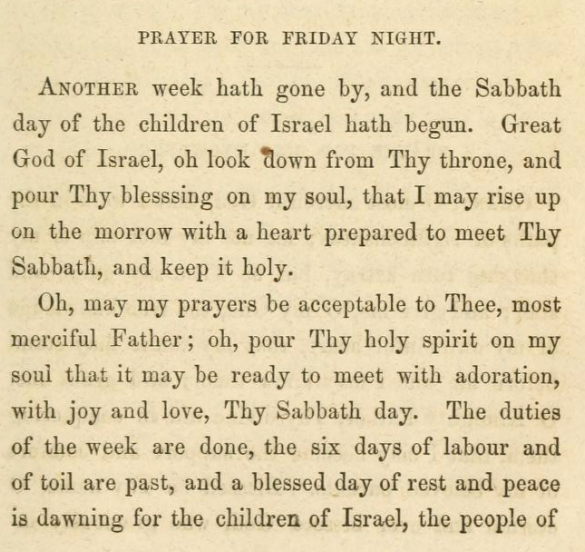Contributor(s): Shared on: 13 May 2023 under the Creative Commons Zero (CC 0) Universal license a Public Domain dedication Categories: Tags: | Contribute a translation | Source (English) |
|---|
|
Prayer for Friday night. | |
Another week hath gone by,
and the Sabbath day
of the children of Israel
hath begun. | |
Great God of Israel,
oh look down from Thy throne,
and pour Thy blesssing on my soul,
that I may rise up on the morrow
with a heart prepared to meet Thy Sabbath,
and keep it holy. | |
We are removed even from the small remnant of our race —
there are none here to keep it
save ourselves. | |
Oh, may my prayers be acceptable to Thee,
most merciful Father;
oh, pour Thy holy spirit on my soul
that it may be ready
to meet with adoration,
with joy and love,
Thy Sabbath day. | |
The duties of the week are done,
the six days of labour and of toil are past,
and a blessed day of rest and peace
is dawning for the children of Israel,
the people of God,
though now we bow beneath His wrath
in a stranger land. | |
Oh, let not worldly thoughts
interfere with Thy Sabbath;
but grant me,
oh merciful and ever blessed God,
a spirit of adoration and of love
to descend upon my soul! | |
Oh, grant that I may rise early,
with a glowing yet a contrite heart,
to meet Thy Sabbath,
that holy day which Thou
in Thine infinite mercy
hast ordained to give rest and peace
to Thy people Israel. | |
Oh, God of my Fathers,
hear me, God of Israel!
Almighty and ever blessed God,
oh, answer me! | |
May Thy great name
be exalted and praised
for evermore! —
Amen. |
“Prayer for Friday night” by Grace Aguilar was published posthumously by her mother Sarah Aguilar in Essays and Miscellanies (1853), in the section “Sacred Communings,” pp. 169-170. In the UK edition of Sacred Communings (1853) the prayer appears with small variations of spelling and punctuation on pages 75-76. The UK edition also includes the detail that this prayer was written when the family lived in Teignmouth, Devon (1828-1840). Source(s)
 Grace Aguilar (2 June 1816 – 16 September 1847) was an English novelist, poet and writer on Jewish history and religion. Although she had been writing since childhood, much of her work was published posthumously. Among those are her best known works, the novels Home Influence and A Mother's Recompense. Aguilar was the eldest child of Sephardic Jewish refugees from Portugal who settled in the London Borough of Hackney. An early illness resulted in her being educated by her parents, especially her mother, who taught her the tenets of Judaism. Later, her father taught the history of Spanish and Portuguese Jews during his own bout with tuberculosis which had led the family to move to the English coast. After surviving the measles at the age of 19, she began to embark on a serious writing career, even though her physical health never completely recovered. Aguilar's debut was an anonymous collection of poems, The Magic Wreath of Hidden Flowers. Three years later she translated Isaac Orobio de Castro's Israel Defended into English at her father's behest. Later her The Spirit of Judaism drew interest and sales in both Britain and the United States after being published in Philadelphia by Isaac Leeser. He added a preface to the work elucidating his differences with her, the first of many clashes her work would have with mainstream Jewish thought. In the 1840s her novels began to attract regular readers, and Aguilar moved back to London with her parents. Despite her success, she and her mother still had to operate a boys' Hebrew school to stay solvent, which she resented for the time and energy it took from her writing. In 1847, she became ill again with a spinal paralysis which she did not let prevent her from visiting her brother in Frankfurt. Her health worsened and she died there that September. Aharon Varady (M.A.J.Ed./JTSA Davidson) is a volunteer transcriber for the Open Siddur Project. If you find any mistakes in his transcriptions, please let him know. Shgiyot mi yavin; Ministarot naqeni שְׁגִיאוֹת מִי־יָבִין; מִנִּסְתָּרוֹת נַקֵּנִי "Who can know all one's flaws? From hidden errors, correct me" (Psalms 19:13). If you'd like to directly support his work, please consider donating via his Patreon account. (Varady also translates prayers and contributes his own original work besides serving as the primary shammes of the Open Siddur Project and its website, opensiddur.org.) Read a comment / Leave a comment (moderated) Works of related interest: |









![[prayer for] saturday night, 31 december 1836 (Grace Aguilar 1853) - cropped](https://opensiddur.org/wp-content/uploads/2023/05/prayer-for-saturday-night-31-december-1836-Grace-Aguilar-1853-cropped-250x250.png)
![[prayer for] saturday night, 14 january 1837 (Grace Aguilar 1853) - cropped](https://opensiddur.org/wp-content/uploads/2023/05/prayer-for-saturday-night-14-january-1837-Grace-Aguilar-1853-cropped-250x250.png)


Leave a Reply